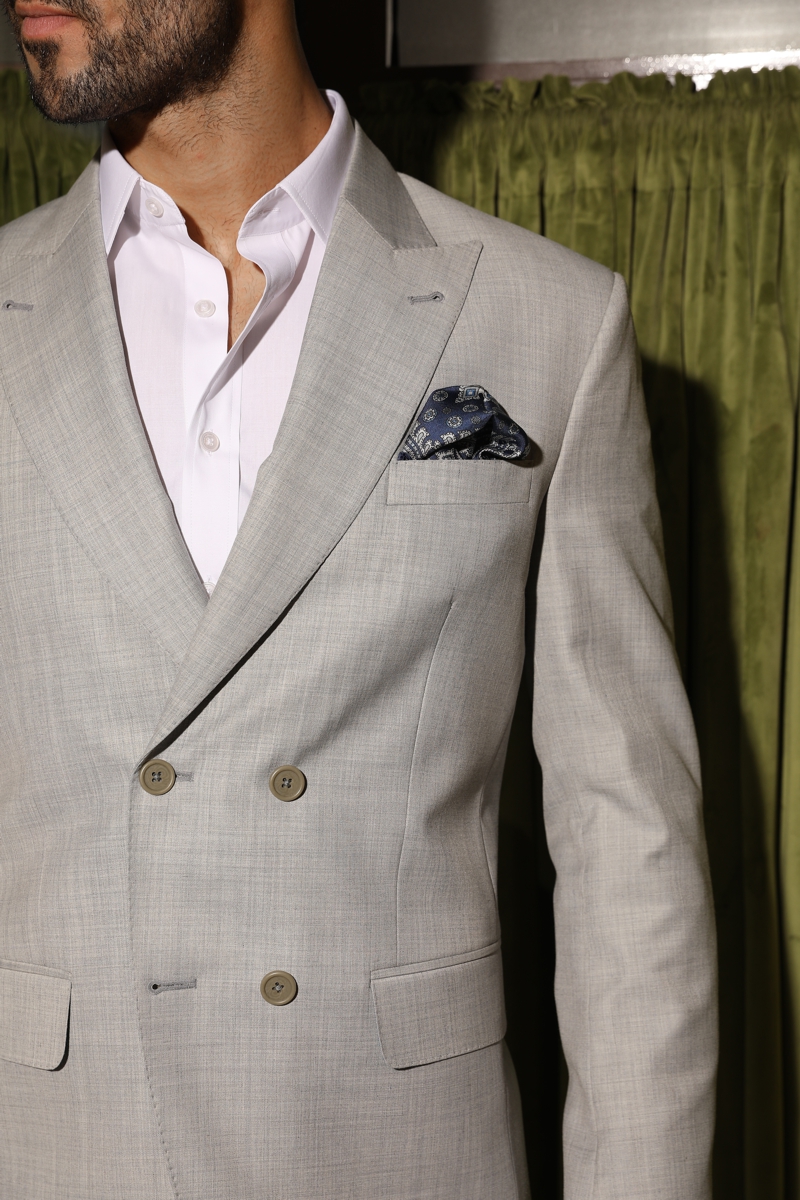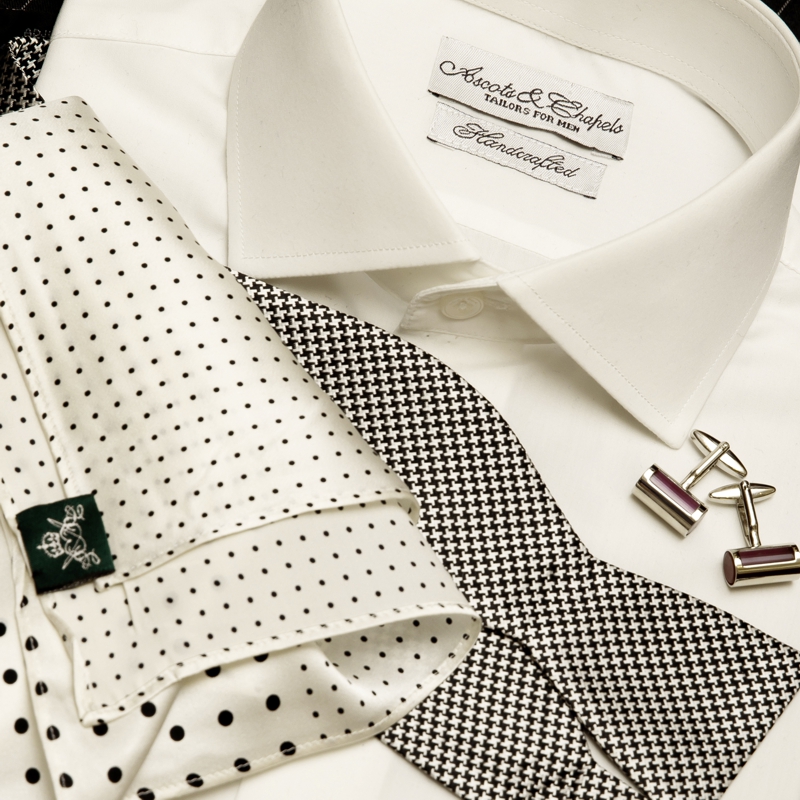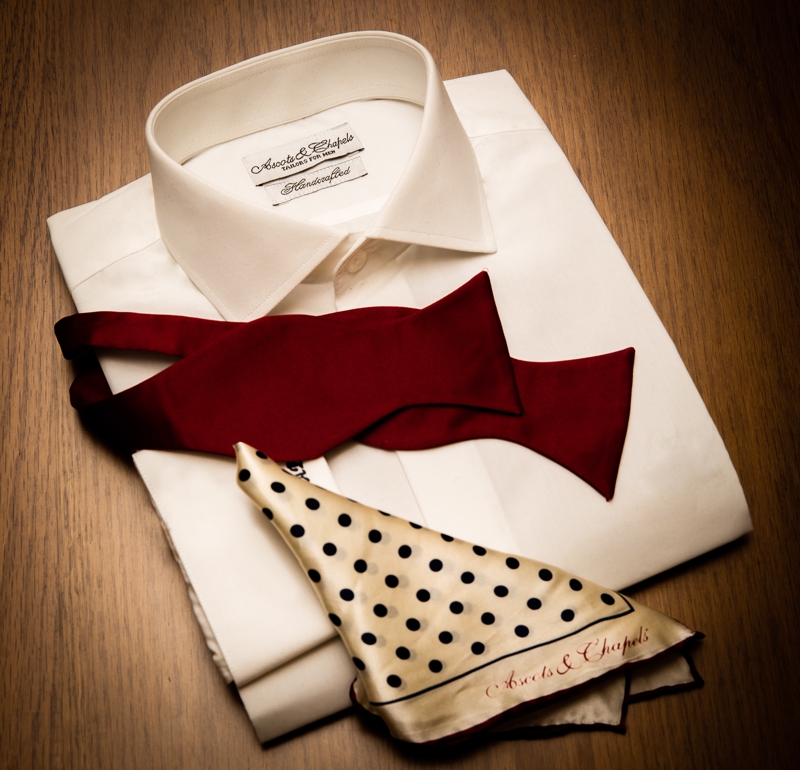
It’s easy to forget about the humble shirt. Somehow, it doesn’t hold quite the same gravitas as an impeccably tailored jacket, or a flamboyant silk tie. But while it might be the most innocuous garment in your wardrobe, a good shirt is also an unsung hero—versatile, hard-working, and essential.
From the boardroom to the ballroom, the right shirt can elevate your look or tone it down. And with countless options on the market, your choices are, quite literally, endless. Gone are the days when you could get away with a Don Draper-style white shirt every day. Now, there are crisp oxfords, playful prints, sleek linen, bold stripes, button-downs, and spread collars to consider. Whether you’re suiting up for a black-tie event, a casual Friday, or a summertime soirée, mastering the art of shirting is crucial.
So, let’s dive into the fine art of shirting, and uncover the dos and don’ts of this wardrobe staple.
TIES AND CUFFLINKS: TO WEAR OR NOT TO WEAR?
The first rule of shirting might surprise you: less is more, especially when it comes to ties and cufflinks. These accessories, though small, pack a serious sartorial punch, so use sparingly.
Ties are a must for formal occasions, professional settings, and any event where you want to make a lasting impression. A crisp, well-knotted tie signifies respect, power, and a nod to tradition. Pair a silk tie with a spread-collar shirt under a well-tailored suit, and you’re playing in the big leagues. Business meetings, weddings, and high-profile dinners are prime occasions for ties.
Ditching the tie is a powerful statement in itself. If you’re aiming for easy breezy smart-casual, going sans tie is the way to go. A button-down shirt, maybe with a blazer and chinos, can give you a polished but approachable look. First dates, casual Fridays, or an art gallery opening? Leave the tie. Just be sure your shirt collar is structured enough to stand on its own. There is never an excuse for a limp collar.
Cufflinks follow the same rule of formality. They’re the epitome of elegance, so save them for when you’re in a double-cuff shirt, and resist the temptation to wear them to the office. Think black-tie events, weddings, and high-stakes meetings. In fact, we would go as far as to suggest wearing an unbuttoned cuff in the right situation to avoid that “middle management” look. But beware–cuffs should fit your wrists perfectly. Too long, and you risk looking like you’ve raided your dad’s wardrobe.

CHOOSING THE RIGHT FABRIC: IT’S ALL IN THE WEAVE
Now, onto fabric. This can drastically change the look and feel of your entire outfit, especially when paired with a suit.
Whether flannel or worsted, wool suits call for shirts that provide a smooth contrast, such as cotton poplin or broadcloth. Lightweight with a fine weave, these give a sleek finish that complements the rich texture of wool in cooler months.
Pair linen with equally breezy fabrics like a linen or cotton-linen blend shirt. The relaxed, breathable nature of these fabrics complements the casual cool of a linen suit, perfect for garden parties, beach weddings, or any occasion where you want to keep your cool–literally.
Meanwhile, tweed’s heavy, textured nature pairs best with a more substantial shirt. Oxford cloth, with its rougher texture and thicker weave, is ideal.

WING-TIPPED BIB FRONT DRESS SHIRTS: THE PINNACLE OF FORMALITY
The wing-tipped bib front dress shirt, designed for white-tie and black-tie events, is the big gun in your shirting arsenal.
For white-tie events, your wing-tipped shirt should be paired with a white vest, white bow tie, and a tailcoat. This is the most formal dress code there is–think royal and public ceremonies, weddings and balls. Anything less would be considered, well, undressed.
When it comes to black-tie, the same wing-tipped bib front shirt can be worn, but with a black bow tie and a tuxedo. Black-tie is slightly less formal, but it still demands sartorial rigor. The bib front adds a touch of detail that’s just enough to make you stand out, while still adhering to the dress code.
SHORT SLEEVE SHIRTS: TREAD LIGHTLY
Much like trying to pull off white jeans, a short sleeve can be tricky. When done right, it can look effortlessly cool; when done wrong, it smacks of 90s boy band reunion.
As a general rule of thumb, short-sleeved shirts are best suited for casual, warm-weather occasions. Think summer barbecues, a day out on the boat, or a casual dinner by the beach. Stick to light fabrics like linen or cotton, and keep the patterns minimal. Avoid wearing them in formal or professional settings, no matter how hot it is.

ROLLING UP YOUR SLEEVES: AN ART FORM
Instead of reaching for a short-sleeved shirt, roll up your sleeves. The most stylish way to do so is with the “master roll.” Unbutton the cuff, flip the cuff back and inside out, fold it over once (hiding the cuff behind the sleeve fabric), and leave it there.
Remember, your elbows should only ever be on show if you’re going to be working. Avoid bunching your sleeves around your forearms as it gives a sloppy impression.
PATTERNED SHIRTS: PROCEED WITH CAUTION
Once you’ve mastered the fundamentals of fit, you can start getting creative and play with patterns for an instant punch to your wardrobe. If you’re a confident chap and like to express your personality through your clothes, there’s no reason to hold back. Go for checks, stripes, or even florals if you’re feeling particularly bold. Just make sure to balance the rest of your outfit: if your shirt is loud, keep everything else subdued. Richer, muted tones in autumn and winter pair perfectly with dark business suits, whereas raised color palettes work better once the temperature rises.
That said, if you feel uncomfortable with a pattern, there is absolutely nothing wrong with opting for a solid color. Remember, the goal is to wear the shirt, not let the shirt wear you. And nothing sets off a dark suit and good tan as well as a crisp, high-thread count, perfectly fit white shirt.
FINAL WORDS: THE POWER OF THE PERFECT SHIRT
The humble shirt is anything but. It’s a cornerstone of your style and the foundation of a well-curated wardrobe. Whether you’re opting for a crisp, formal look with a tie and cufflinks, embracing the laid-back vibe of rolled-up sleeves, or making a bold statement with a patterned piece, mastering the nuances of shirting is key to elevating your style game.
So, the next time you’re getting dressed, give your shirt the attention it deserves. Wear what makes you feel like the best version of yourself, and the rest will fall into place–seamlessly.
Author: Gary Sweeney
